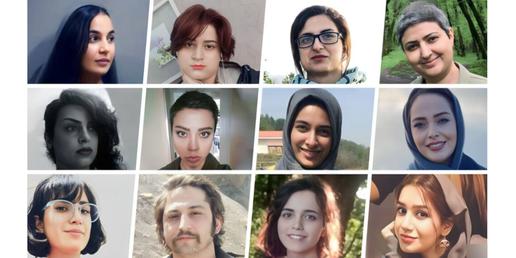12 defendants, including 11 women’s rights activists, put on trial at end of February 2024 in northern Iran over participation in “Woman, Life, Freedom” protests
UN: “Crimes v. Humanity” by Iran’s Authorities During “Woman, Life, Freedom” Protests
UPDATE, APRIL 1:
Eleven women’s rights activists have been given prison sentences of one to more than six years by a Revolutionary Court in northern Iran over the “Woman, Life, Freedom” protests.
The activists were seized by security and intelligence forces in August 2023 in a crackdown ahead of the first anniversary of the death of Mahsa Amini, who passed away in police custody after she was detained and reportedly beaten by “morality police” in Tehran.
Forough Samiminia was condemned to 3 years, 6 months, and 1 day for “assembly and collusion to disrupt national security” and 2 years, 7 months, and 16 days for “membership in an illegal group”.
Others who were sentenced for “propaganda against the system”, “assembly and collusion”, and “forming an illegal group” included Jelve Javaheri, Zahra Dadras, Sara Jahani, Matin Yazdani, Yasmin Hashdari, Shiva Shahsiah, Negin Rezai, and Azadeh Chavoshian.
“Sources close to the activists” said the activists have been subjected to “intense interrogation and physical abuse”, with pressure to confess to “fabricated deeds”.
UPDATE, MARCH 20:
Leading religious scholar Sedigheh Vasmaghi has refused to appear in an “illegitimate” Iranian court after her detention (see below) for appearing in public without the mandatory hijab.
Vasmaghi, who has criticized the Supreme Leader as a “dictator” and Iran’s leaders as “oppressive”, said she would not be present in a Revolutionary Court with “unjust judges” in a system which is not lawful.
Vasmaghi suffers from heart and blood-pressure issues. Because she has refused to wear the hijab in the prison infirmary, she has been denied treatment by a doctor.
UPDATE 1213 GMT:
Sedigheh Vasmaghi, a leading religious scholar and political activist, has been arrested by plainclothes security agents.
Vasmaghi was seized at her home by four agents, said her husband Mohammad Ebrahimzadeh. They seized her laptop, medications, and her cane.
Vasmaghi has been outspoken in her challenge of the religious establishment and the compulsory hijab. In recent months she appeared without a head scarf in public to protest the repression of women.
UPDATE, MARCH 18:
Journalist Ali Moslehi has been given sentences of six years and two months.
Lawyer Saeed Gholamian said the Kashan Revolutionary Court condemned Moslehi to 15 months and one day in prison for “insulting sanctity”, “spreading lies”, “insulting the leadership”, and “propaganda against the Islamic Republic”.
Moslehi will serve the longest sentence of three years and one month.
The journalist, a political columnist for the local news website Kashan News, was arrested at his home in Kashan last July 20.
Journalist Rouhollah Nakhaie was taken to Tehran’s Evin Prison on March 16th to begin a two-year prison sentence on charges of “assembly and collusion against national security” and “propaganda against the state.”
Journalists accused of criticizing state policies, revealing… pic.twitter.com/WqqskBZeSt
— IranHumanRights.org (@ICHRI) March 17, 2024
UPDATE, MARCH 13:
Iran’s authorities have arrested two women for dancing in public while dressed as “Haji Firooz”, a character of renewal associated with the forthcoming Persian New Year.
The women were seized after a video of their performance in Tehran’s Tajrish Square went viral on social media. They are accused of “social defiance” and “norm-breaking”.
خبرگزاری تسنیم، نزدیک به سپاه پاسداران، یک روز پس از آنکه روز پنجشنبه ۱۷ اسفند تصاویری از رقص و شادمانی دو زن نوازنده و رقصنده در میدان تجریش تهران در شبکههای اجتماعی منتشرشد، از بازداشت آنها خبر داد .
این دو زن در شمایل «حاجی فیروز» به رقص و نواختن موسیقی پرداخته بودند. به… pic.twitter.com/lT4cbnWwuP
— ایران وایر (@iranwire) March 9, 2024
ORIGINAL ENTRY, MARCH 7:
Mostafa Tajzadeh, a former Interior Minister and Presidential advisor and long-time political prisoner, has been summoned by Iran’s authorities to face new charges.
The summons follows Tajzadeh’s depiction of Iran’s March 1 elections for Parliament and the Assembly of Experts as a “historic failure” for the ruling system, holding the Supreme Leader responsible.
The official declaration of turnout was 40.5%, a historic low for the Islamic Republic. Iranian journalists and activists say the actual figure is between 25% and 35%, but risk detention if they publish the claim.
Tajzadeh wrote last month that Ayatollah Khamenei had withheld “the contributions of capable individuals” and hindered “essential structural reform”.
A leading reformist activist, Tajzadeh was imprisoned in June 2009, amid the mass protests over the disputed Presidential election. He was convicted of “assembly and collusion against national security” and “propaganda against the regime” and given a 6-year prison sentence and a 10-year ban on political and press activities. In 2014, he was handed another sentence of one year.
Tajzadeh was finally released in 2016. However, in September 2022, he was returned to prison, on a 5-year sentence for “collusion against national security” “spreading falsehoods”, and “propaganda against the Islamic Republic”.
Iran Authorities Imprison Leading Politician Tajzadeh For 5 Years
The new charges against him, imposed by the Tehran Revolutionary Court, include “gathering and colluding to act against national security” and “propaganda activity against the Islamic Republic”.
Tajzadeh was told to appear in court by Saturday to give an answer, but has said he will not accept the summons.

